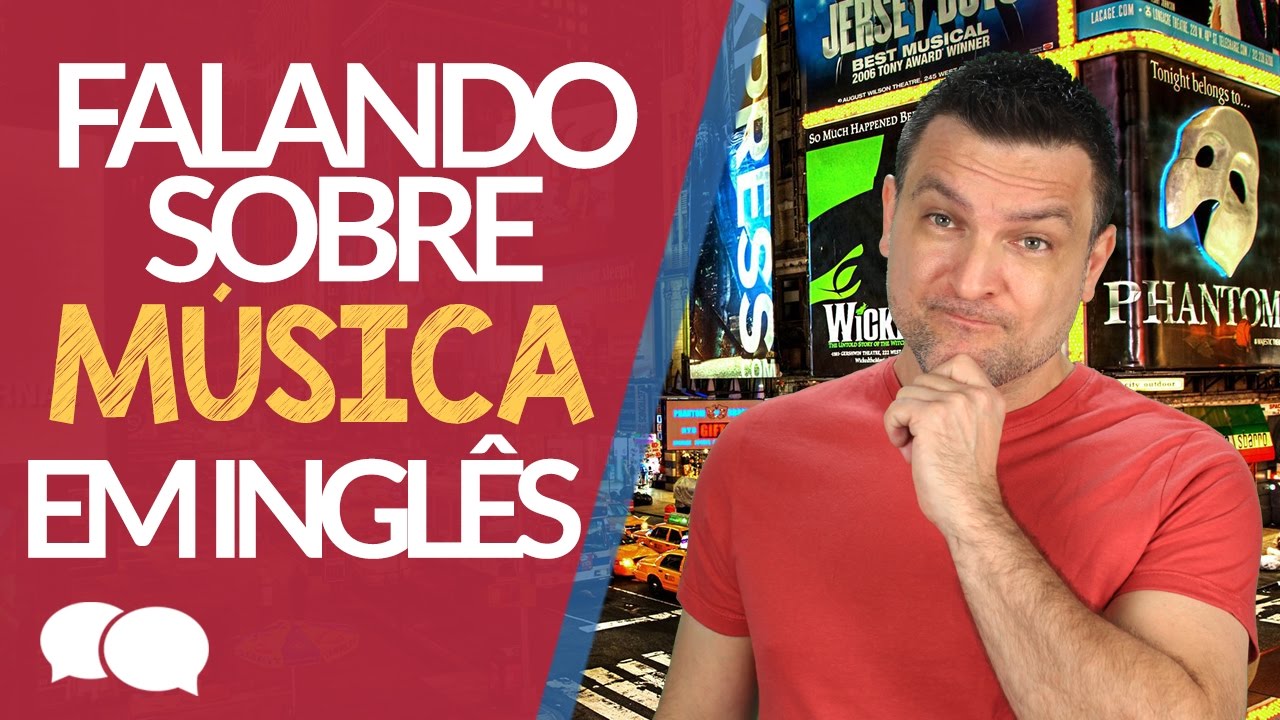Hello friends and welcome back to another post!
Hoje vamos aprender vocabulário sobre músicas em inglês. Veremos como falar se você gosta ou não de ouvir música, estilos de música e instrumentos. So, let’s get started!
Músicas em inglês
Do you listen to music a lot? — Você escuta bastante música?
What kind of music do you like? — Que tipo de música você gosta?
I listen to a lot of music, but my sister doesn’t. — Eu escuto bastante música, mas minha irmã não.
I don’t listen to a lot of music, but my brother listens to rock. — Eu não escuto bastante música, mas meu irmão escuta rock.
My sister and my father listen to Reggae, but my mother and I don’t. — Minha irmã e meu pai escutam Reggae, mas minha mãe e eu não.
I don’t listen to country music. My father doesn’t listen to rock. — Eu não escuto música country. Meu pai não escuta rock.
Tipos de músicas em inglês
What do people listen to in your country? — O que as pessoas escutam no seu país?
In my country people listen to Samba. — No meu país as pessoas escutam samba.
Samba is a very popular kind of music in Brazil. — Samba é um tipo de música muito popular no Brasil.
Do you like american music? — Você gosta de música americana?
Yes, I do. — Sim, eu gosto.
No, I don’t. — Não, eu não gosto.
Does your sister listen to rock? — Sua irmã escuta rock?
Yes, she does. — Sim, ela escuta.
No, she doesn’t. — Não, ela não escuta.
Instrumentos em inglês
Do you play any instruments? — Você toca algum instrumento?
Can you play any instruments? — Você sabe tocar algum instrumento?
I don’t play any instruments, but my sister plays the guitar. — Eu não toco nenhum instrumento, mas minha irmã toca violão.
Does your brother play any instruments? — O seu irmão toca algum instrumento?
Yes, he does. He plays the guitar. — Sim, ele toca. Ele toca violão.
I play drums and my friend plays the keyboard. — Eu toco bateria e meu amigo toca teclado.
My friend Bob can play a lot of instruments. — Meu amigo Bob sabe tocar vários instrumentos.
He can play the guitar. He can player the piano. And he can play the drums. He can’t play bass, though. — Ele sabe tocar violão. Ele sabe tocar piano. E ele sabe tocar bateria. No entanto, ele não sabe tocar baixo.
Where did you learn how to play the guitar? — Onde você aprendeu a tocar violão?
I learned how to play the guitar in school. — Eu aprendi a tocar violão na escola.
Why did you learn to play the guitar? — Por que você aprendeu a tocar violão?
I learned to play the guitar because I wanted to play my favorite songs. — Eu aprendi a tocar violão porque eu queria tocar minhas músicas preferidas.
John plays the drums. He learned how to play the drums when he was a little kid. — John toca bateria. Ele aprendeu a tocar bateria quando ele era criança.
Where did John learn how to play the drums? — Onde o John aprendeu a tocar bateria?
He learned in school. He didn’t learn at home. — Ele aprendeu na escola. Ele não aprendeu em casa.
I also learned how to play the guitar in school. I didn’t learn at home. — Eu também aprendi a tocar violão na escola. Eu não aprendi em casa.
Were you in a band? — Você estava/esteve em uma banda?
Yes, I was in a band. — Sim, eu estava.
No, I wasn’t in a band. — Não, eu não estava.
Was your sister in a band? — Sua irmã estava/esteve em uma banda?
Yes, she was in a band. — Sim, ela estava em uma banda.
Amigos, ficamos por aqui hoje. Agora que você sabe falar sobre músicas em inglês, deixe nos comentários o tipo de música que você escute. Aprenda inglês com música. Até a próxima!
TRANSCRIÇÃO DO VÍDEO
(O texto a seguir é uma transcrição completa e sem edições do vídeo.)
In this class we are going to talk about music. Nesta aula nós vamos falar sobre música. Do you listen to music a lot? Do you listen to music a lot? A lot quer dizer muito. What kind of music do you like? What kind of music do you like? I listen to a lot of music, but my sister doesn’t. I listen to a lot of music, but my sister doesn’t. I don’t listen to a lot of music, but my brother listens to rock. I don’t listen to a lot of music, but my brother listens to rock. My sister and my father listen to Reggae, but my mother and I don’t. My sister and my father listen to Reggae, but my mother and I don’t. I don’t listen to country music. My father doesn’t listen to rock. I don’t listen to country music. My father doesn’t listen to rock. Pay attention here. Preste atenção aqui. I listen to. She listens to. We listen to. They listen to. I don’t listen to. She doesn’t listen to. We don’t listen to. They don’t listen to. Very good. Question. What do people listen to in your country? O que as pessoas escutam no seu país? What do people listen to in your country? In my country people listen to Samba. Samba is a very popular kind of music in Brazil. Samba isn’t popular in Canada. Samba is a very popular kind of music in Brazil. Samba isn’t popular in Canada. Do you like american music? Yes, I do. No, I don’t. Do you like american music? Yes, I do. No, I don’t. Does your sister listen to rock? Yes, she does. No, she doesn’t. Does your sister listen to rock? Yes, she does. No, she doesn’t. Very good. Agora vamos falar sobre instrumentos. Se você toca algum instrumento ou não. Do you play any instruments? Or: Can you play any instruments? Você toca algum instrumento ou você pode ou consegue tocar algum instrumento? Do you play any instruments? Can you play any instruments? I don’t play any instruments, but my sister plays the guitar. I don’t play any instruments, but my sister plays the guitar. Lembre-se de falar the guitar, play the guitar. I play the guitar, she plays the guitar, my sister plays the guitar. Does your brother play any instruments? Yes, he does. He plays the guitar. I play drums and my friend plays the keyboard. I play drums and my friend plays the keyboard. My friend Bob can play a lot of instruments. Lembre-se que usamos can para falar que podemos ou temos a habilidade de fazer alguma coisa. Neste caso aqui estou falando de my friend Bob, meu amigo Bob. My friend Bob can play a lot of instruments. A lot of, muitos. He can play the guitar. He can player the piano. And he can play the drums. He can’t play bass, though. He can’t play bass, though. Ele não pode ou não consegue tocar contrabaixo, no entanto. Though no final da frase quer dizer no entanto, para contrariar alguma coisa. For example. Por exemplo. I speak Portuguese and Spanish. I don’t speak english though. Eu falo português e espanhol. Eu não falo inglês, no entanto. I speak Portuguese and Spanish. I don’t speak english though. Very good. Question. Where did you learn how to play the guitar? Onde você aprendeu como tocar guitarra? Where did you learn how to play the guitar? How to play, como tocar. I learned how to play the guitar in school. Eu aprendi como tocar guitarra na escola. I learned how to play the guitar in school. Learn today. Learned yesterday. Why did you learn to play the guitar? Por que, why, did you learn to play the guitar? I learned to play the guitar because I wanted to play my favorite songs. Lembre-se que o why na pergunta e because na resposta. I learned to play the guitar because I wanted to play my favorite songs. John plays the drums. He learned how to play the drums when he was a little kid. He learned in school. O John toca bateria. Ele aprendeu como tocar bateria quando ele era uma criança pequena. Ele aprendeu na escola. John plays the drums. He learned how to play the drums when he was a little kid. He learned in school. Where did John learn how to play the drums? He learned in school. He didn’t learn at home. He learned in school. He didn’t learn at home. Ele aprendeu na escola. Ele não aprendeu em casa. Didn’t, não. I also learned how to play the guitar in school. I didn’t learn at home. Lembre-se que also é também. I also learned how to play the guitar in school. I didn’t learn at home. Question. Were you in a band? Você esteve em uma banda? Were you in a band? Yes, I was in a band. No, I wasn’t in a band. Was your sister in a band? Yes, she was in a band. Então vimos que listen to music, escutar música. Play an instrument, tocar um instrumento. Learn how to play, aprender como tocar. Learn how to play. A popular kind of music, um tipo de música popular.


